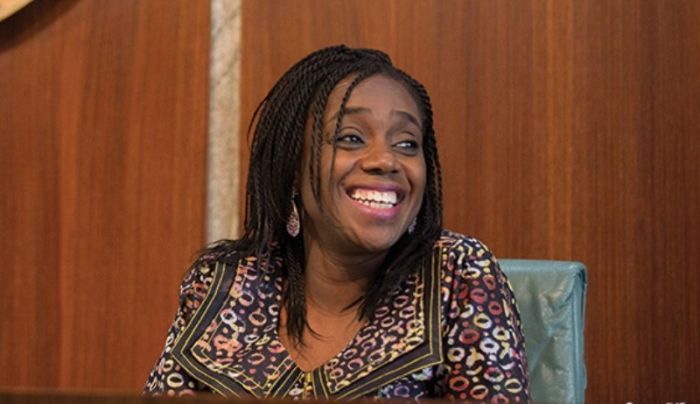
A rundown of Kemi Adeosun’s career path, from life after school till her last job has been analysed following her resignation as minister of finance.
When Kemi Adeosun was appointed into the cabinet of President Muhammadu Buhari in 2015, she must have thanked her stars without knowing that a day like this would come. Not every commissioner ends up being a minister, hence after working under Ibikunle Amosun, governor of her home state of Ogun, Adeosun could have thought of other jobs but not succeeding the globally-acclaimed Ngozi Okonjo-Iweala.
While her colleagues presiding over other ministries are looking forward to the May 29 date, she bowed out just seven months to the end of the current administration, having been caught in a certificate scandal. Premium Times had reported how her National Youth Service Corps (NYSC) exemption certificate was forged. Although she initially displayed calmness in the face of the storm, Adeosun succumbed to the pressure which followed the revelation.
From the time she was appointed in 2015 up till the moment she resigned, she was fraught with controversies and breakthroughs, including Nigeria bouncing back from its first recession in 29 years.
Below is a rundown of her career path, from life after school till her last job.
HER TIME IN BIG UK COMPANIES
In 1989, she graduated from the University of East London (previously Polytechnic of East London) where she studied Applied Economics, landing her first official appointments in big UK companies. Her first job was at British Telecoms from where she joined Goodman Jones as an audit officer up till 1993.
In 1994, she proceeded to the London Underground Company as internal audit manager and in 1996, joined Prism Consulting, a finance firm, where she worked till 2000. She left the company that year to work at the PricewaterhouseCoopers as a senior manager for two years before returning to Nigeria in 2002.
Upon her return to the country, she worked at Chapel Hill Denham and was in 2011, appointed the commissioner of finance in Ogun.
PULLING NIGERIA OUT OF ITS WORST RECESSION IN 29 YEARS
Under Adeosun’s watch, Nigeria slipped into its first economic recession in 29 years and critics used this as an avenue to discredit her. Data from the National Bureau of Statistics (NBS) showed country’s economy contracted by 2.06 percent to record its lowest growth rate in three decades and in the first quarter of 2016, shrank by 0.36 percent to hit its lowest point in 25 years.
The last time Nigeria suffered such fate was under the regime of Ibrahim Babangida when the economy recorded consecutive decline of 0.51 percent and 0.82 percent in first and second quarters of 1987.
The former minister and her team were, however, able to maneuver the country out of recession about a year later, though with little or no impact of this felt at the time. She can’t be given the entire credit but her contributions made the feat possible.
DEBT AND MORE DEBT
Under Adeosun, Nigeria’s debt profile rose to a worrisome level, hitting N22.7 trillion or $73.21 billion in the first quarter of 2018. The Debt Management Office (DMO) had said the rise in total debt stock was recorded after the federal government issued a $2.5 billion Eurobond in February.
Before 2005, Nigeria had an external debt stock of $36 billion, which had been carried over from the military years, dating back to 1985.
In October 2005, with Okonjo-Iweala as finance minister, Nigeria and the Paris Club announced a final agreement for debt relief worth $18 billion after Nigeria paid $12 billion.
The deal was completed on April 21, 2006, when Nigeria made its final payment and its books were cleared of any Paris Club debt, bringing Nigeria’s external debt profile to just $3 billion while domestic debt was only about N1 trillion.
Expressing worry over the high debt profile, Amina Mohammed, the deputy secretary-general of the United Nations (UN) and a former member of Buhari’s cabinet, had said: “The debt issues are really big, I mean, having experienced what it was for Ngozi (Okonjo-Iweala) to get debt relief. It took her a few years to convince people, and we are now back again in my country, with a level of debt that is worrying, but its happening all over. Africa, is that the way we want to go?”
Ironically, Mohammed, who like Adeosun was among the few women in Buhari’s government, left her position for what can be considered a higher office but same cannot be said of Adeosun.
BATTLE WITH SEC DG
One of her down-times as minister was during the feud with Mounir Gwarzo, suspended director-general of the Securities and Exchange Commission (SEC). In November, she suspended Gwarzo over allegations bothering on abuse of office, at a time the commission was planning to audit Oando Plc.
Adeosun said the suspension was to allow for unhindered investigation of N104 million severance package pocketed by Gwarzo shortly after he was named DG in 2015. But Gwarzo attributed the suspension to his refusal to stop the forensic audit of Oando in line with the directive of the minister.
The shares of the company were placed on technical suspension in October 23, 2017 following the announcement of a forensic audit in the wake of alleged massive “manipulation of the company’s shareholding structure.”
Adeosun, however, dismissed Gwarzo’s accusation, saying the decision to suspend Oando’s shares emanated from the ministry.
“That the original decision taken by SEC on October 20, 2017 to suspend the shares of Oando Plc and conduct a forensic audit, was approved and endorsed by the federal ministry of finance,” she had said.
While speaking at a house of representatives committee meeting, he alleged the minister suspended him for refusing to halt the forensic probe of Oando, which, according to him, she was against.
But the former minister had denied this and accused Gwarzo of blackmail.
ROLE IN ABACHA LOOT
After the Nigerian government had paid Enrico Monfrini, a Swiss lawyer, for the repatriation of $321 million Abacha loot, TheCable had reported how Abubakar Malami, minister of justice and attorney-general of the federation hired two Nigerian lawyers to complete an already completed job for another fee of $17m.
However, Adeosun refused to approve the payment of the dubious fees to the lawyers. After TheCable reported her refusal to approve the payment, the ministry issued a statement describing the report as false.
However, Adeosun kept mum after TheCable threatened to publish evidence of her chat, confirming that she refused to approve the dubious fees.
AND THEN THE BIG BLOW
Adeosun woke up to the last nail on the coffin that buried her career as finance minister when on July 7, Premium Times, released an incriminating report of Adeosun skipping the compulsory one year service corps and forging her exemption certificate.
Having finished her first degree at 22, she was not entitled to exemption on the grounds of age except she was above 30, according to the NYSC Act.
TheCable had reported how top officials of the corps plotted to help Adeosun out of the scandal.
NYSC insiders told TheCable that the officials were looking for a way to help her out by blaming the mess on the former director-general, Yusuf Bomoi, a retired brigadier-general who died on September 18, 2017.
The forged exemption certificate bears Bomoi’s signature. Adesoun had failed to comment on the accusation when the report surfaced online but the pressure kept piling. Following wide public outcry, the NYSC said it would probe the allegation. The corps had later said Adeosun applied for an exemption certificate but did not state if it granted it to her or not.
Buhari reportedly ordered an internal investigation but the findings did not favour her. Adeosun has made her own contribution to her fatherland and would be remembered for her in office.
Source: TheCable

